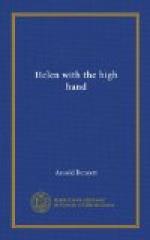“No music!” said Jos.
“You see,” Mrs. Prockter explained, “the lawn is at the far end of the garden, and it is impossible to hear the piano so far off. If it were only a little piano we could move it about, but it’s a grand piano.”
In James’s next speech was to be felt the influence of champagne. “Look here,” he said, “it’s nobbut a step from here to the Green Man, is it?”
“The Green Man!” echoed Mrs. Prockter, not comprehending.
“Ay, the pub!”
“I believe there is an inn at the bend,” said Mrs. Prockter; “but I don’t think I’ve ever noticed the sign.”
“It’s the Green Man,” said James. “If you’ll send some one round there, and the respex of Mr. Ollerenshaw to Mr. Benskin—that’s the land-lord—and will he lend me the concertina as I sold him last Martinmas?”
“Oh, Mr. Ollerenshaw!” shrieked Jos. “Can you play for dancing? How perfectly lovely it would be!”
“I fancy as I can keep your trotters moving, child,” said he, gaily.
Upon this, two spinsters, the Misses Webber, wearing duplicates of one anxious visage, supervened, and, with strange magic gestures, beckoned Mrs. Prockter away. News of the episode between Andrew Dean and Helen had at length reached them, and they had deemed it a sacred duty to inform the hostess of the sad event. They were of the species of woman that spares neither herself nor others. Their fault was, that they were too compassionate for this world. Promising to send the message to Mr. Benskin, Mrs. Prockter vanished to her doom.
Within a quarter of an hour a fete unique in the annals of Hillport had organised itself on the lawn in the dim, verdurous retreats behind Mrs. Prockter’s house. The lawn was large enough to be just too small for a tennis-court. It was also of a pretty mid-Victorian irregularity as regards shape, and guarded from the grim horizons of the Five Towns by a ring of superb elms. A dozen couples, mainly youngish, promenaded upon its impeccable surface in obvious expectation; while on the borders, in rustic chairs, odd remnants of humanity, mainly oldish, gazed in ecstasy at the picturesque ensemble. In the midst of the lawn was Mrs. Prockter’s famous weeping willow, on whose branches Chinese lanterns had been hung by a reluctant gardener, who held to the proper gardener’s axiom that lawns are made to be seen and not hurt. The moon aided these lanterns to the best of her power. Under the tree was a cane chair, and on the cane chair sat an ageing man with a concertina between his hands. He put his head on one side and played a few bars, and the couples posed themselves expectantly.
“Hold on a bit!” the virtuoso called out. “It’s a tidy bit draughty here.”
He put the concertina on his knees, fumbled in his tail-pocket, and drew forth a tasselled Turkish cap, which majestically he assumed; the tassel fell over his forehead. He owned several Turkish caps, and never went abroad without one.




